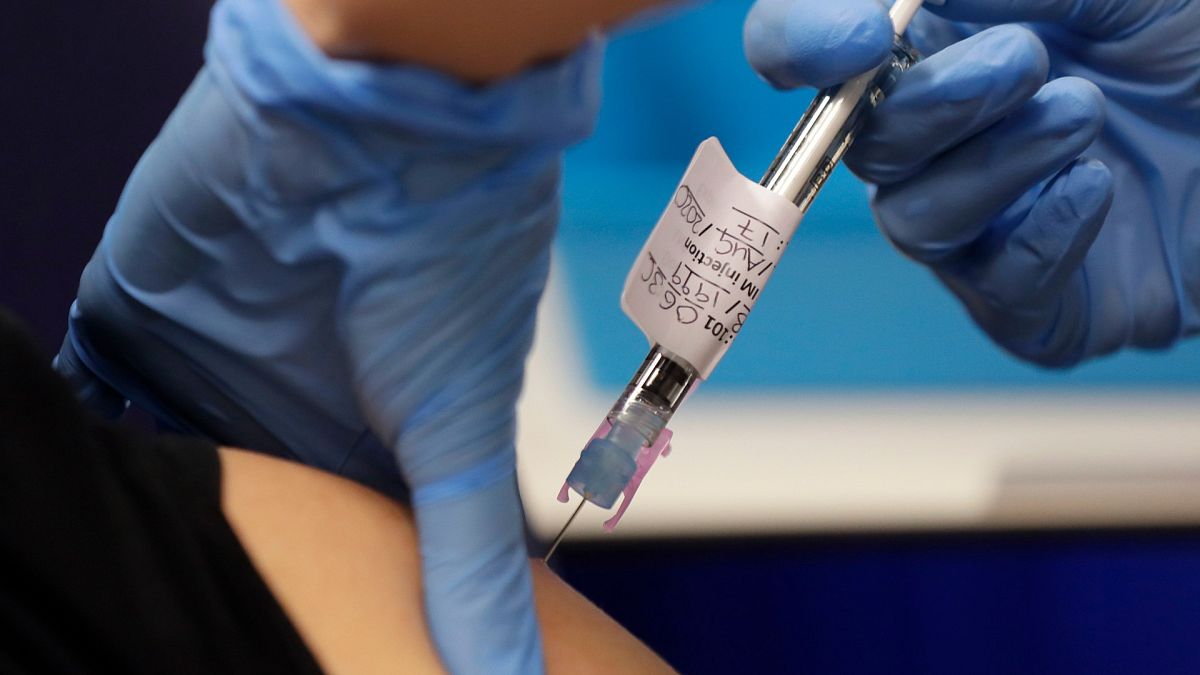Researchers found that respondents who are sceptical about science and authority are more likely to refuse the vaccine.
Only half of Britain's population say they would absolutely accept having a COVID-19 vaccination, and one in six are firmly against it, a new poll has found.
A survey of more than 2,200 people conducted by Ipsos MORI for researchers at King's College London found that only 53 per cent say they’d be certain or very likely to get a vaccine against coronavirus, if one becomes available.
A further 20 per cent said they're fairly likely to get the vaccine but around one in six (16 per cent) affirmed they are unlikely to or definitely won’t.
Researchers found that respondents who are sceptical about science and authority are more likely to refuse the vaccine.
The share of respondents who said they definitely won't get the vaccine was greater among those who believe face masks are bad for people's health (37 per cent), or do not reduce the spread of COVID-19 (34 per cent), and among those who think face masks are a way for the government to control the public (34 per cent).
It was also particularly high among respondents who think that too much fuss is being made about the pandemic (36 per cent) and those who say they do not trust scientific experts more as a result of how they’ve helped during the crisis (33 per cent).
The way people access news about the pandemic also plays a role with 27 per cent of those who say they get a great deal of information on COVID-19 from WhatsApp say they’re unlikely to or definitely won’t get a vaccine.
Researchers also found a generational divide with young people aged 16 to 34 twice as likely to refuse the vaccine than those between the ages of 55 and 75 -- 22 per cent and 11 per cent respectively.
Authorities across Europe have warned in recent weeks that a flare up in cases is being driven by young people and have urged them to continue to social distance and take precautionary measures despite the summer temperatures.
The World Health Organisation also stressed that even those who suffer from mild COVID-19 infections can have long-lasting health effects including significant changes to their cardiovascular system.
The poll found however that a very small minority of people -- 4 per cent -- believe that a vaccine against SARS-CoV-2 will never be developed although fewer than half of respondents -- 44 per cent -- expect it to happen within the next 12 months.
"Misperceptions about vaccines are among our most directly damaging beliefs, and they’re clearly influencing people’s intentions during the coronavirus crisis," Professor Bobby Duffy, director of the Policy Institute at King’s College London, said in a statement.
"While one in six in the UK say they are unlikely to or definitely won’t get a potential vaccine against Covid-19, this rises to around a third or more among certain groups, with a clear link to belief in conspiracy theories and mistrust of government, authority and science."
"Vaccines are one of our greatest achievements, and there is a great deal of faith that we’ll eventually develop one for Covid-19 – but more still need to be convinced of how important it could be for ending this crisis," he added.
Herd immunity against a disease transmissible from human to human only works if most people in the population are vaccinated.
For measles, herd immunity is only achieved when at least 93 to 95 per cent of the population is vaccinated.
A 2018 report into the state of vaccination across the European Union found that vaccine refusal had increased n several member states between 2000 and 2017. The bloc recorded 9,420 confirmed cases of measles in 2017, the highest tally since 2010.
France, Greece, Italy, Romania and the UK, where first-dose measles immunisation rates are below the herd immunity threshold, accounted for 86 per cent of the infections.


